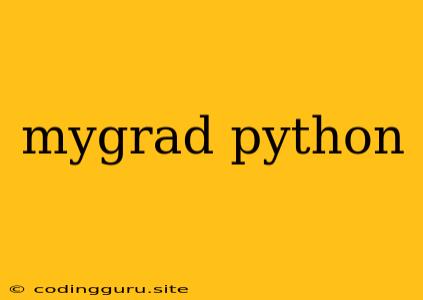Dive into the World of Automatic Differentiation with MyGrad in Python
MyGrad, a powerful Python library, stands as a cornerstone for automatic differentiation, a crucial technique in the field of machine learning and deep learning. This library empowers you to compute gradients of complex functions with ease, greatly simplifying the optimization process in your models.
What is Automatic Differentiation?
Think of automatic differentiation as a magical calculator that handles the messy task of finding derivatives for you. Instead of manually calculating the derivative of a function, you simply feed your function to MyGrad, and it automatically calculates the gradient with incredible accuracy.
Why MyGrad?
- Efficiency: MyGrad employs sophisticated algorithms to calculate gradients efficiently, even for complex functions. This means you can train your models faster and with less computational resources.
- Flexibility: MyGrad seamlessly integrates with other popular Python libraries like NumPy, providing a seamless workflow for your machine learning projects.
- Open-Source and Active: MyGrad is an open-source library with an active community, ensuring continuous improvements, updates, and support.
Getting Started with MyGrad
-
Installation: Simply use the following command to install MyGrad:
pip install mygrad -
Basic Differentiation: Let's begin with a simple example:
import mygrad as mg x = mg.Var(3) y = x**2 y.backward() # Calculate the gradient print(x.grad) # Output: 6.0In this example, we define a variable
xwith the value 3 usingmg.Var. We then calculateyas the square ofx. Callingy.backward()triggers the automatic differentiation process, resulting in the gradient ofywith respect toxbeing stored inx.grad, which is 6.0. -
Gradients of Complex Functions: MyGrad handles complex functions effortlessly:
import mygrad as mg import numpy as np x = mg.Var(np.array([1, 2, 3])) y = mg.sin(x) * mg.cos(x**2) y.backward() print(x.grad)Here, we use NumPy arrays and apply trigonometric functions within the function definition. MyGrad calculates the gradient with respect to the array
x, providing a detailed gradient for each element.
Real-World Applications:
- Neural Network Training: MyGrad is a powerful tool for training neural networks by efficiently calculating gradients for the weights and biases.
- Optimization Algorithms: MyGrad is used extensively in optimization algorithms like gradient descent, allowing you to find optimal parameters for complex models.
- Scientific Computing: MyGrad can be used for gradient-based analysis in various scientific applications, from physics simulations to financial modeling.
Beyond the Basics:
- Higher-Order Derivatives: MyGrad allows you to calculate higher-order derivatives, useful in more advanced applications like Hessian-based optimization.
- Custom Functions: You can define your own custom functions and have MyGrad automatically compute their gradients, making it highly customizable.
- Tensor Support: MyGrad supports tensor operations, making it ideal for working with multi-dimensional data in machine learning.
Conclusion:
MyGrad is a game-changer for anyone working with gradient-based methods in Python. Its simplicity, efficiency, and flexibility make it an indispensable tool for machine learning, deep learning, and various scientific applications. By harnessing the power of automatic differentiation, you can efficiently optimize your models, accelerate research, and unlock new possibilities in your field.
